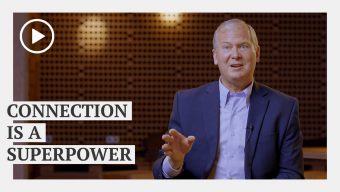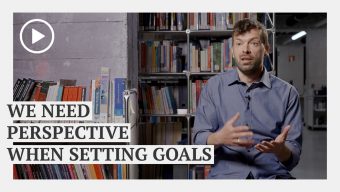Even in times of difficulty – or perhaps particularly so – we can find spaces of opportunity. The pandemic is the example that comes straight to mind these days, with many people taking advantage, when their health and situation allows it, to use the downtime of quarantines and travel restrictions to learn new skills, practice new hobbies, spend time with their families, and more. In some ways, this is similar to another experience that many people confront in their later life. The period of a person’s life that we call “retirement,” while it is often – but not always – anticipated with excitement or even relief causes a sudden interruption to life’s usual structure which in turn deprives us of important references that make up our personal identity. It is important and obvious to point out that retirement (as opposed to the pandemic) can, in most cases, be planned for in advance, yet the disruption can still be jarring. Work loses part of its importance and retirement puts us in uncharted territory, isolated, insecure, and without a sense of purpose. Retirement can – like the pandemic has – generate doubts about the future and cause feelings of stress and fear.
There are also significant differences between how we experience the pandemic versus retirement. The risk of contagion of Covid-19 focuses our attention on protecting ourselves against the danger of becoming ill. Meanwhile, the greatest challenge of retirement is, apart from ensuring sufficient financial resources, taking control of our own lives and replacing the void that is left by work with new projects to keep us active and socially connected.
In both cases, however, there are not only losses and limitations but new experiences and possibilities. With some luck, we can learn to live at a slower pace and we have more free time to strengthen our family ties, explore new interests or rediscover passions that we had pushed to the side. We can learn to discern what is essential to our particular lives and place value not only on what we enjoy but what is within our reach. Such times allow us to look inward, to reflect on the past, think about our present, and plan new beginnings. Adapting to an altered reality forces us to activate our personal resources and learnings from past experiences – and this transition period helps us grow as a person.
There are two types of responses to a life change: At one extreme, there is denial of the impact of what has happened, a resigned acceptance that manifests in passively waiting for the situation to improve on its own. On the other extreme, and after a transient period of confusion, it is possible to take a proactive attitude and, for example, start new projects based on the changed circumstances and thereby regain some control over the situation and have confidence in our own ability to not only overcome but rise above difficulties. The scope of our response is determined by our ability to recover creatively. This is called resilience: the capacity to overcome change by reordering priorities and taking steps that bring us closer to who we are and whom we want to become.
It is a good idea to reach retirement with an exciting project in mind if not already in the works because it makes for a more creative journey.
From this point of view, we can consider how we have and are still managing the consequences of the pandemic in order to understand how we might react in the future when faced with other important periods of transition. This reflection enables us to assess the extent to which we are able to restructure our psychological resources, better appreciate our strengths and limitations, and even evaluate whether we are taking full advantage of any potential within the current situation.
Such self-awareness will help those nearing retirement to make plans that are realistic rather than based solely on aspiration. Likewise, it is an opportunity for anyone not yet thinking about retirement to begin to prepare for it by taking the time now to develop new interests and hobbies, correct negative tendencies, and improve the balance between professional and personal life. Retirement signals the end of an important chapter of a person’s life and the beginning of another, one in which is built without the traditional structure of work and employment. It is a good idea to reach retirement with an exciting project in mind if not already in the works because it makes for a more creative journey. Another reason to cultivate a variety of relationships and a range of interests throughout life.
It is also important to keep in mind that the entire concept of retirement has been evolving and, in the future, even more workers will choose to delay a complete retirement and either stop working gradually or alternate periods of retirement with periods back at work, for example in a consultancy capacity.
When I retired, I too faced my own set of challenges. It helped that I knew that I wanted to reserve part of my time for continuing to explore my professional interest in the human mind. When I discovered that there were very few publications in Spanish about the psychological dimension of retirement, I decided to make a contribution. I was interested in finding out what strategies other retired people use to adapt to and make sense of this stage of life. The findings of my study, carried out with Richard Margolies, Ph.D, are published in the book La Jubilación, Una Nueva Oportunidad (Retirement, a New Opportunity) (LID Editorial) and come from a socio-psychoanalytic study of 150 people (93 men and 57 women) in the Madrid area representing a variety of backgrounds who shared their life’s vision and trajectory up to their current situation. The main goal was to identify the motivations that guided each retiree’s adaptive strategies – their orientations – in facing the life changes introduced by retirement. Five distinct orientations came to light:
The Task Doers (29.3%)
This group continues to work in some capacity post retirement and their new responsibilities provide structure and meaning to their lives and can also serve to preserve their identities. This orientation is more common among men who previously had rewarding jobs.
The Leisure Seekers (35.3%)
As is indicative of the name, this group freely enjoys all the recreation options that retirement finally makes possible in their lives. They tend to put aside fixed commitments and timetables and prefer to improvise. More women follow this orientation and those surveyed noted that their choice of how to spend retirement was a result of the past overload of combining work and home life duties.
The Searchers for Calm (9.3%)
This group’s priority is to have a relaxing retirement and they often choose to center their life on the home, take advantage of what is already available to them, and only rarely set new goals for themselves. They often retire before the age of 65 because they are tired from working or simply want to get out of job that is not the right match for them.
The Explorers (10.6%)
Focused on learning new things or developing something further, this group approaches retirement as a chance for renewal. In the study, there were more women than men in this group, many of whom commented that they hoped to focus on themselves after so many years of dedication to others.
The Out of Focus (15.3%)
This group does not set up or maintain meaningful retirement projects. The majority of this group in the study was comprised of men who had experienced compulsory early retirement. They now have difficulty either defining their goals or finding the energy to achieve them and in many cases express doubts or dissatisfaction with their current life and reproach themselves for not exercising their abilities.
Any change in life, no matter how difficult, can help us let go of old habits, gain new perspectives, and seek new purpose and meaning. Flexibility is a key component of adaptation and it allows us to test out ways that we can approach our new reality without (too much) fear of failure. This enables us to influence our new circumstances through initiative and perseverance in pursuing new activities or recovering latent interests.
Dealing with the consequences of the pandemic and entering retirement are transitions that might help us reassess the conscious and unconscious views that we have of ourselves and of the world we inhabit. It is important to face these transitions with a forward-looking attitude and a constant disposition towards learning and personal growth. If we dare, we can prepare ourselves to overcome our own resistance to change and the fear that naturally arises whenever we venture outside of our comfort zone.
© IE Insights.








